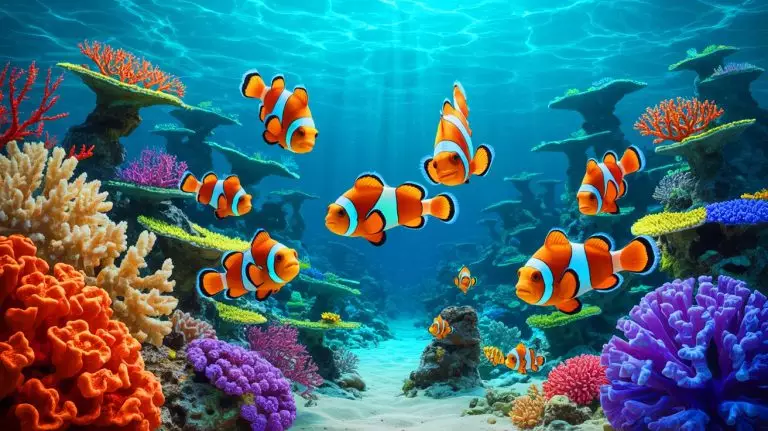| IN A NUTSHELL |
|
In a remarkable discovery, scientists have uncovered a surprising survival tactic among clownfish, the beloved marine creatures popularized by the film “Finding Nemo.” Recent research reveals that these fish have the extraordinary ability to shrink their own bodies in response to rising ocean temperatures. This adaptation not only enhances their survival in increasingly warm waters but also maintains their complex social structures. The study, conducted by Newcastle University, offers groundbreaking insights into the resilience of coral reef ecosystems and poses important questions about the future of marine life in the face of climate change.
The Phenomenon of Clownfish Shrinking
Clownfish, known for their vibrant colors and symbiotic relationship with sea anemones, have recently demonstrated a surprising capability: the ability to shrink their body size during environmental stress. According to a study conducted in Kimbe Bay, Papua New Guinea, 100 out of 134 clownfish observed underwent physical shrinking during a marine heatwave. This phenomenon was previously undocumented in coral reef fish but has now been clearly identified as a response mechanism to combat the adverse effects of rising water temperatures.
Melissa Versteeg, a PhD researcher at Newcastle University, led the study and highlighted that this shrinking is not merely a case of getting slimmer, but an actual reduction in body length. The study, which tracked the fish over five months, provides compelling evidence that shrinking offers a critical survival advantage by enhancing the odds of survival by up to 78%. This adaptation echoes behaviors seen in other species, such as marine iguanas, which also shrink under environmental stress by reabsorbing bone material.
The Social Dynamics of Size Reduction
Beyond individual survival, the study found that size reduction plays a crucial role in maintaining social harmony among clownfish. These fish live in strict social hierarchies, often as monogamous breeding pairs. The research revealed that survival rates were higher when both members of a pair shrank in coordination. This suggests that shrinking is not only a response to environmental pressures but also a strategy to sustain social balance, potentially minimizing conflict within the pair or group.
It was fascinating to observe how quickly clownfish could adapt to environmental changes. The study documented that the clownfish regulated their size flexibly, responding to heat stress as individuals and as breeding pairs. This finding underscores the importance of social dynamics in survival strategies and highlights the complex interplay between biological and social factors in the animal kingdom.
Implications for Coral Reef Ecosystems
The discovery of clownfish shrinking in response to heat stress provides critical insights into the resilience of coral reef ecosystems. As marine heatwaves become more frequent due to climate change, understanding how species adapt is essential for conservation efforts. The study’s findings emphasize both the robustness and vulnerability of these ecosystems, showing that while clownfish can adapt to survive, the broader implications of such adaptations are still not fully understood.
Dr. Theresa Rueger, a Senior Lecturer in Tropical Marine Sciences and senior author of the study, notes that if shrinking is widespread among different fish species, it could explain the declining size observed in many marine species globally. This revelation opens new avenues for research, offering a potential explanation for changes in fish sizes and urging further studies to understand the long-term effects on marine biodiversity.
Future Directions for Research
The groundbreaking findings from this study have been published in Science Advances, marking a significant milestone in marine biology research. However, they also raise numerous questions about the future of marine ecosystems and the adaptability of other species. If clownfish can shrink to survive, what other adaptive strategies might be employed by different marine organisms? How will these adaptations impact the delicate balance of oceanic ecosystems?
As researchers continue to explore the mechanisms behind this remarkable ability to shrink, the study underscores the need for comprehensive investigations into the effects of climate change on marine life. What other secrets do our oceans hold, and how can we leverage this knowledge to protect the rich biodiversity that inhabits them?
Did you like it? 4.4/5 (20)







Wow, I never thought I’d hear about shrinking clownfish! Nature never ceases to amaze. 🌍🐠
I appreciate the research, but what actions are being taken to prevent ocean heatwaves?
Does shrinking affect the clownfish’s ability to breed or find food?
This is fascinating! Clownfish are more resilient than we thought. 😃
I wonder if this adaptation is reversible once ocean temperatures normalize.
Honestly, I find it hard to believe fish can shrink. Sounds like sci-fi! 😄
Can this shrinking ability be passed down to future generations of clownfish?
Thanks for the article. It’s a wake-up call to address climate change more seriously. 🌡️
How did the researchers measure the fish shrinking? Sounds like a challenging task!
Do you think this discovery might lead to more conservation efforts for clownfish?
It’s amazing how nature finds ways to adapt, but it shouldn’t have to. 😢
Are there any negative consequences for clownfish that shrink?
Does this adaptation occur in all clownfish species or just specific ones?
Wow, shrinking fish! Next, we’ll hear about flying turtles. 😂
I’m glad researchers are studying these effects. We need to know more about climate impacts.
What role do clownfish play in coral reef ecosystems, and how might shrinking affect that role?
Could this shrinking be related to the clownfish’s diet or food availability?
How does this shrinking mechanism work on a biological level? 🧬
This makes me wonder what other adaptations marine life might develop. 🤔
I hope this research gets the attention it deserves. It’s eye-opening! 🐟
Is there any direct link between clownfish shrinking and coral bleaching?
Is there any evidence that other fish species exhibit similar shrinking behavior?
Are there any plans to do similar studies in different ocean regions?
What can be done to help clownfish and other marine species cope with climate change?
I’m curious if human activities are contributing directly to these heatwaves.
This was an enlightening read! Thanks for sharing such crucial information. 😊
Could shrinking be a temporary response, or do clownfish remain smaller permanently?
How do clownfish shrinking affect their predators or prey in the ecosystem?
I had no idea climate change could cause such direct physical changes in marine life. 📚
Does this study suggest any potential for human intervention to assist clownfish?
Thank you for bringing attention to this important research. Climate change affects us all. 🙏
So, does this mean we might get a mini Nemo sequel? 🤔🎬
Incredible study! But what long-term effects might this have on clownfish populations?
I’m a bit skeptical. How do we know the heatwaves caused the shrinking and not other factors?
Dear sustainability-times.com administrator, You always provide great examples and real-world applications.